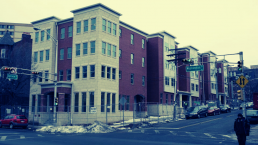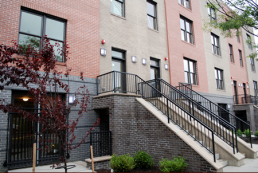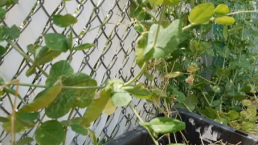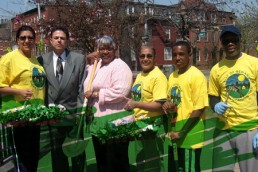LPCCD's Pilot Real Estate & Business Development Training Program
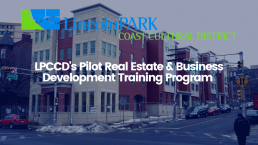
As part of LPCCD’s efforts to transform our neighborhood, block by block, we are offering hands-on training in the fundamentals of real estate development and business planning for entrepreneurial individuals with various levels of building renovation, rehabilitation and/or new construction experience.
We’re seeking people who want to help rebuild and strengthen Lincoln Park’s small-scale buildings (1-3 stories, work done with small crews by hand without major equipment) house by house and block by block. People who want to build a business, improve the neighborhood, generate income, and build local wealth.
This 11-week course is for people at various levels of experience—whether you want to be on a construction crew helping to rehab or build small-scale projects, have “side hustle” projects renovating and rehabbing a duplex, or want to become a full-time small developer with a number of projects.
Some of the topics we will cover include:
- Planning and management basics for your own business as a sole proprietor or small company
- Roles you can play in small-scale development and how to grow your current practice
- How your projects can build on the design principles of the traditional neighborhood
- Using a development budget to assess potential projects and rates of return
- What’s needed to obtain bank financing
- How to navigate local rules, regulations and requirements

Participants will learn through self-paced video study sessions (about 30-90 minutes each week) alternated with full-group Zoom calls for live presentations, discussion and Q&A.
You will need access to a computer, Zoom app, and cell phone to occasionally take and email photos.
Apply period is now closed.
A Conversation with Verizon Community Partnerships Initiative
VERIZON'S COMMUNITY PARTNER TALKS
with LPCCD
"Sustainable Communities Focus"

Lincoln Park Cultural Coast District is a proud community partner of Verizon. The Verizon Community Partnerships Initiative to celebrate Verizon-supported community organizations and highlight their important work. Mark Bocchieri, Verizon’s Director of State Government Affairs virtually sat down with our Executive Director Anthony Smith to discuss building sustainable communities, the importance of the arts ecosystem and how Lincoln Park was early in developing a Green Jobs Training Program with PSEG which graduated and placed 100 Newarkers in jobs, which helps breaks the cycle of generational poverty.
LPCCD NEIGHBORHOOD ACTION PLAN
Lincoln Park’s Action Plan strives to facilitate the creation of intergenerational black and brown wealth through the implementation of a 10-year neighborhood plan.
Through the strategies described below, the plan seeks to position Lincoln Park as a healthy and engaged community with a vibrant arts and culture scene, thriving businesses, housing options, and economic opportunities for all residents.
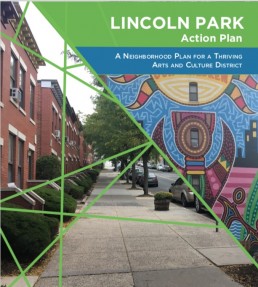
To learn more, click the button below to read about our neighborhood plan.
LPCF Year #2
It’s that time again! The Lincoln Park Community Farm (LPCF) is gearing up for its second year of providing fresh, affordable produce to the community. Our foods have not been covered with pesticides or any harmful chemicals. Our freshly grown vegetables will be ideal for those looking to lead a healthy lifestyle, for vegetarians, and for those who simply enjoy the quality and taste of nutrient-rich foods.
This summer we’ve expanded the list of herbs and vegetables that we’ll be providing. Expect more root vegetables such as potatoes, yams, and horse radishes. Our CSA members will be able to choose from among a variety of herbs like lemon balm, mint, and basil just to name a few to include in their share bundle package. We also have kale, chard, tomatoes, mustard greens, and much more. Click here for a complete list of what we produce.
Other new initiatives we are starting this season is a drop off delivery option which will be available to Lincoln Park residents only. Plus we will have cooking demonstrations among other exciting communal activities. It is our hope that you will enjoy the array of produce we’ve been working hard to grow for you.
Farm Photos
This is just a short footage of photos taken at our farm yesterday. You will see herbs, rows of tomatoes, radishes, carrots, sugar snap beans, our baby lettuce that is being grown hydroponically, purple cabbage, chard, peppers, mustard greens, our growing sunflowers, and much more. Enjoy!
Why local?
Have you ever left a supermarket frustrated at the lack of fresh, quality produce available? I’d often hear the elders remark that “food just doesn’t taste as good as it used to” and with good reason. The complex process of how food travels from the farm to the supermarket and then to our plates has a profound affect on the foods we consume. The flavor and rich nutrients of the produce starts to diminish as a result of the food distribution process and foods being sold out of season.
It’s no secret that there is a direct correlation between food and health wellness so how our foods are grown and where it derives matter. So where does our food come from? Produce grown by farmers are sent to a factory to be packaged and processed. The processed food is then sent to a warehouse where it will later be shipped out via plane, train, or truck to the supermarket and placed on shelves for days or weeks before anyone purchases it. The preservatives and packaging of the food helps to maintain its shelf life as it awaits to be bought by, you, the customer.
Once purchased, the food is on its way to its final destination: your plate. Your food travels quite a distance before it ever enters your mouth. No wonder “food just doesn’t taste as good as it used to.” Before we had mega food chain stores, people would buy food fresh from their local farmer or pluck ripe vegetables straight from their own backyards. While there have been attempts to include non processed produce at supermarkets, on the whole, the best quality food anyone can purchase is from a local farmer’s market, a community farm, or a supermarket that primarily sells organic foods although the latter option can become pricey.
Why local? When you purchase your foods locally from a farmer, you are typically receiving seasonal produce that has not been covered with preservatives. Not to mention that locally grown foods are bursting with rich flavors and are the most nutritional in value for your body. Your food doesn’t travel thousands of miles before you get to enjoy it. You can build a close relationship with your farmer and learn exactly how the food is grown, how it is cultivated, and can see first hand where it comes from. You can also learn a lot about what foods are in season and increase your knowledge in agriculture in general.
Furthermore, an often underestimated and underappreciated reality of buying local is the economic benefit it has for the entire community. When a community member purchases a product from a local distribution channel, they are in essence circulating their hard-earned dollars back into the hands of folks that are more likely going to redistribute it into their community. This is a very different dynamic than going to a big box store where our money goes to corporate executives that may live thousands of miles away, completely indifferent to the uniqueness of each town, hamlet, or city. It can be argued that where we spend our money is one of the most significant and powerful tools of social change. There are so many great reasons to support locally grown foods.
The other wonderful thing to recognize is that healthy food does not have to be expensive. Search for a farmer’s market or community farm that sells its produce at a reasonable rate. The Lincoln Park Community Farm not only provides a generous bundle of fresh vegetables and herbs at just $20 per share, but we also have cooking demonstrations to teach you how to spice up your food and keep it creative.
Buy local!
michelle raysor – community sustainability intern

